"Peanuts and Diamonds" is a song written by Bobby Braddock. It was first recorded by American country singer-songwriter Bill Anderson. It was released as a single in 1976 via MCA Records and became a major hit the same year.
"Liars One, Believers Zero" is a song written by Glenn Martin. It was first recorded by American country singer-songwriter Bill Anderson. It was released as a single in 1976 via MCA Records and became a major hit the following year.
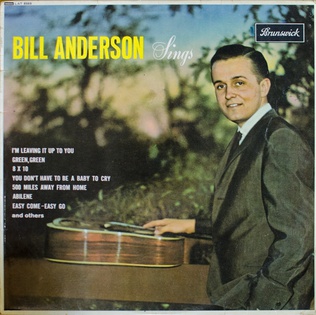
Bill Anderson Sings is a studio album by American country singer-songwriter Bill Anderson. It was released in February 1964 on Decca Records and was produced by Owen Bradley. The album was Anderson's second studio release as a recording artist and included two singles that became major hits on the Billboard country chart. The album itself would also reach positions on the Billboard charts following its release.

I Love You Drops is a studio album by American country singer-songwriter Bill Anderson. It was released in August 1966 on Decca Records and was produced by Owen Bradley. It was Anderson's fifth studio release and included three singles that became major hits on the Billboard country chart. The album would also become a success on the Billboard country albums list upon its release, becoming one of his most successful charting albums.

I Can Do Nothing Alone is a studio album by American country singer-songwriter Bill Anderson. It was released in June 1967 on Decca Records and was produced by Owen Bradley. It was Anderson's seventh studio record and his first album to consist entirely of gospel music. Although the album did not produce any singles, it made peak positions on the Billboard country albums chart.
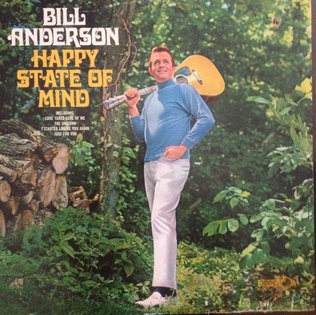
Happy State of Mind is a studio album by American country singer-songwriter Bill Anderson. It was released in September 1968 on Decca Records and was produced by Owen Bradley. Anderson's tenth studio recording, it was also his second studio album released in 1968. Among the songs included on the release was the title track, which became a major hit in both the United States and Canada.
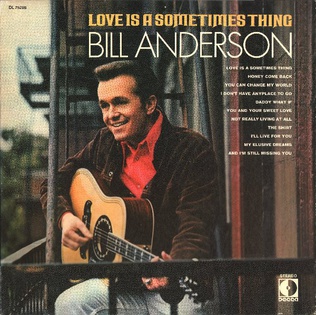
Love Is a Sometimes Thing is a studio album by American country singer-songwriter Bill Anderson. It was released in June 1970 on Decca Records and was produced by Owen Bradley. It was Anderson's fourteenth studio album since signing with the Decca label in 1958. Its only single, the title track, would become a major hit on the Billboard country chart in 1970. The album itself would also reach peak positions on the country albums chart following its release.
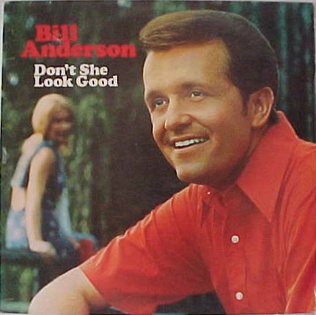
Don't She Look Good is a studio album by American country singer-songwriter Bill Anderson. It was released in November 1972 on Decca Records and was produced by Owen Bradley. The album was Anderson's twentieth studio recording to be issued. It was also his fourth studio album released in 1972. Two additional projects were collaborations with Jan Howard earlier in the year. The album's only single was the title track, which became a major hit on the country charts.

Bill is a studio album by American country singer-songwriter Bill Anderson. It was released in July 1973 on MCA Records and was produced by Owen Bradley. It was Anderson's first studio album to be released on the MCA label after Decca Records merged with the label. It was also his twenty first studio recording to be released and only album project to be issued in 1973. The album included three singles, two of which became number one hits in either the United States and Canada. The album itself also would reach peak positions on national publication charts.

Every Time I Turn the Radio On/Talk to Me Ohio is a studio album by American country singer-songwriter Bill Anderson. It was released in January 1975 on MCA Records and was produced by Owen Bradley.
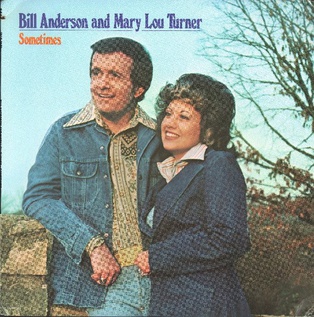
Sometimes is a studio album by American country music artists Bill Anderson and Mary Lou Turner. It was released in January 1976 on MCA Records and was produced by Owen Bradley. It was Anderson's twenty fourth studio recording and Turner's first. The album's title track became a major hit on the country charts in both the United States and Canada. The album also reached major positions on the country chart in the United States. Sometimes was the first collaborative project between Anderson and Turner. Anderson hired Turner to work as his duet partner during this period and the project was one of two recordings they made.

Peanuts and Diamonds and Other Jewels is a studio album by American country singer-songwriter Bill Anderson. It was released in September 1976 on MCA Records. It was co-produced by Owen Bradley and Buddy Killen. It was Anderson's twenty fifth studio recording released during his musical career and second to be released in 1976. The album included three singles issued between 1975 and 1976, two of which became major country hits in both the United States and Canada.
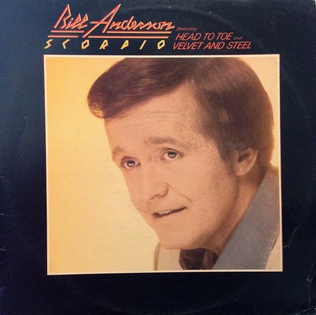
Scorpio is a studio album by American country singer-songwriter Bill Anderson. It was released in April 1977 on MCA Records and was produced by Buddy Killen. Scorpio was Anderson's 26th studio album as a recording artist and first album release of 1977. Another album would follow later in the year. The project produced two singles that became major hits.
"If You Can Live with It " is a song written and recorded by American country singer-songwriter Bill Anderson. It was released as a single in 1973 via MCA Records and became a major hit the same year.
"Can I Come to You" is a song written by Jerry Crutchfield and Buddy Killen. It was recorded by American country singer-songwriter Bill Anderson. It was released as a single in 1974 via MCA Records and became a major hit the same year.
"Every Time I Turn the Radio On" is a song written and recorded by American country singer-songwriter Bill Anderson. It was released as a single in 1974 via MCA Records and became a major hit the same year.
"I Still Feel the Same About You" is a song written and recorded by American country singer-songwriter Bill Anderson. It was released as a single in 1975 via MCA Records and became a major hit the same year.
"Double S" is a song written by Bill Anderson and Buddy Killen. It was first recorded by its co-writer and American country singer-songwriter Bill Anderson. It was released as a single in 1978 via MCA Records and became top 40 hit single.
"Make Mine Night Time" is a song written by Mike Kosser and Curly Putman. It was first recorded by American country singer-songwriter Bill Anderson. It was released as a single in 1980 via MCA Records and became top 40 hit single.
"Country D.J." is a song written and first recorded by American country singer-songwriter Bill Anderson. It was released as a single in 1975 via MCA Records and became top 40 hit single.











